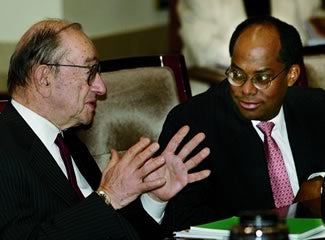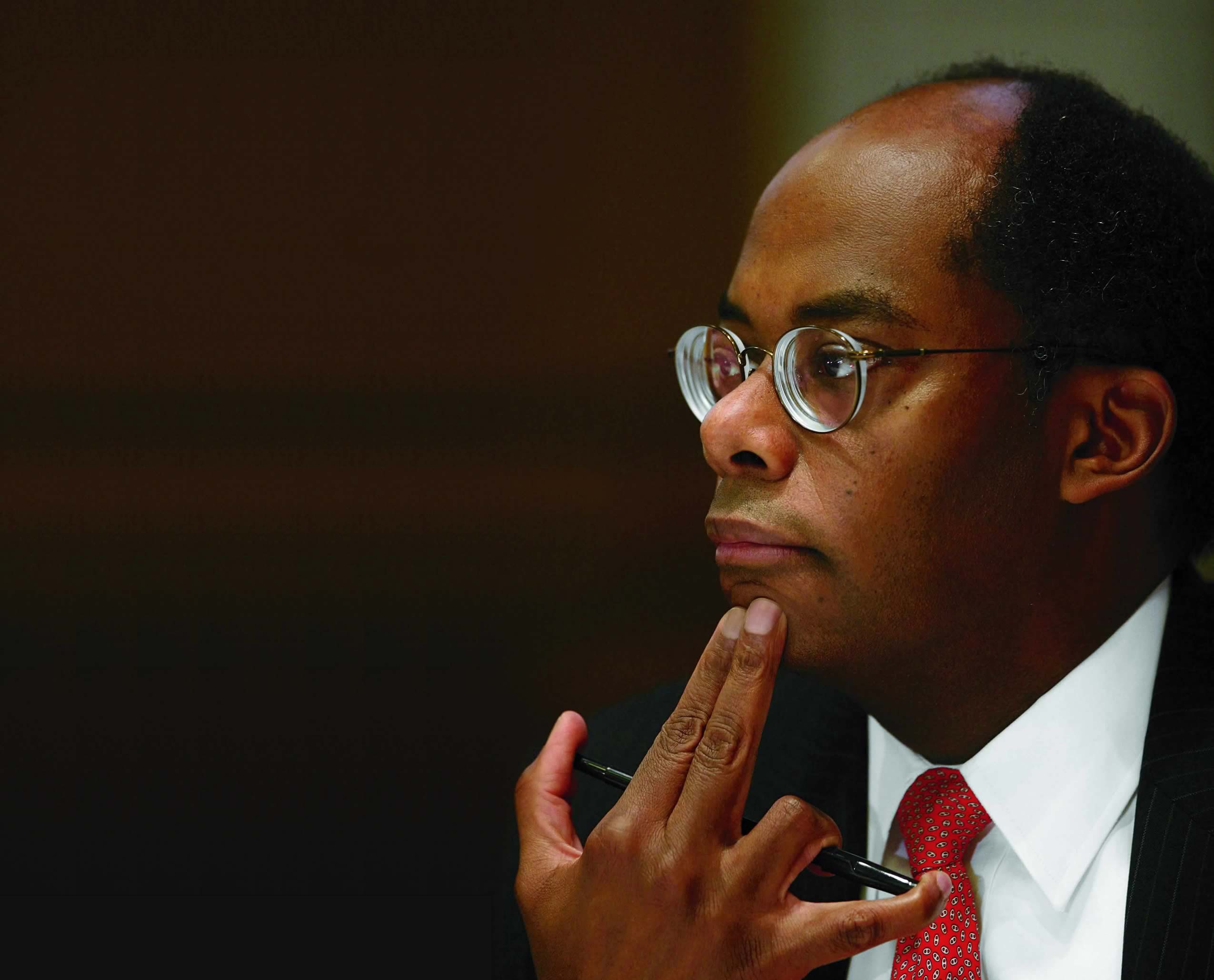Not surprisingly, it hadn’t been easy to get a half-hour on the schedule of the president and CEO of Fortune magazine’s 88th largest corporation in the U.S. But when Roger Ferguson ’79, chief of the financial services giant TIAA-CREF and former vice chair of the board of governors of the Federal Reserve, sat down for an interview in the company’s midtown Manhattan offices, his most salient characteristic seemed his humility. When I thanked him for sharing some helpful career insights, he responded, with a smile, “I live to serve.” After I promised some “whimsical questions,” he pre-empted, “As long as you don’t mind dull aging baby boomer answers.” The office reflected the man. No treadmill desk. No granite appointments. No flat-screen televisions. The highlight of the upcoming weekend? His son’s lacrosse game (Yale beat Brown 11-8, to Dad’s dismay). Hoping to live vicariously, I inquired as to the best perk of being CEO of a $400 billion company. “We have no perks,” he deadpanned. “Every penny that we save goes back to somebody’s retirement. And it’s a $500 billion company.” Facts are facts.
Ferguson traces the beginnings of his career path to the particular fact of President Lyndon Johnson’s appointing Andrew Brimmer as the first-ever black governor of the Federal Reserve in 1966. The appointment combined with the emphasis his parents (a public school teacher and an Army cartographer) had placed on financial literacy to spark an enduring interest in the Fed and monetary policy. In addition to an A.B. and J.D., Ferguson went on to obtain a Ph.D. in economics from Harvard. After three years at Davis Polk & Wardwell and 13 at McKinsey & Co., he got the call that would make his Federal Reserve dream come true. On the line was his former study group partner from graduate school at Harvard, then Deputy Treasury Secretary Larry Summers. Soon afterward, in 1997, President Clinton appointed Ferguson as a governor of the Federal Reserve board, where he rose to the rank of vice chair. Ferguson left the Federal Reserve to join Swiss Re (the world’s second largest reinsurance company) as chair in 2006 and became CEO of TIAA-CREF in 2008. He described himself as “the internal and external brand ambassador” of the “mission-driven” company that is “the most trusted name out there in financial services.” He discussed his personal history, his philosophy of leadership, his vision for Harvard and the nation—and some retirement advice for a graduating 3L.

“I never aspired to be CEO of a company,” he explained, analogizing his career to “a climbing wall, as opposed to a career ladder.” His more traditional start at Davis Polk following graduation first exposed him to something he liked—being in a service profession. He acquired a lawyer’s fundamentals, namely “the ability to be able to distinguish one fact pattern from another and the ability to communicate in a logical fashion.” And it was at the firm that he met his wife (former SEC Commissioner Annette Nazareth, with whom he has two children), “so obviously it was the best step I could have taken,” he said. But after three years, he decided that he wanted to solve “not just legal problems, but bigger business problems.”
For recent graduates, he advised: “Always be looking at that first job as effectively a continuation of a very, very steep learning curve. The world a 28-year-old is going to live in, working for the next 40 years, by definition is unknowable today. The one thing that you will know is that the skill set you have today is just the baseline for what you’ll need going forward.” For Ferguson, success is “all about the ability to keep learning and to figure out what it is that really motivates you.”
“So much in business, and so much in life, is presenting a compelling story.”
Roger Ferguson
In describing the transition from learner to leader, Ferguson drew on his years as a management consultant at McKinsey, neatly bucketing the four key components of leadership: “First, you have to have expertise. People don’t want to follow individuals who don’t have the core technical skills that are necessary, because you’ll lead them to the wrong place.” Second, leaders require empathy. “People want to follow leaders who understand them, who treat them as individuals, who are empathetic.” Third, leaders must be able to communicate. “So much in business, and so much in life, is presenting a compelling story,” he said. “Learning how to present it in a logical fashion so that the audience can follow along, whether it be in giving a speech about the economy, or testifying before Congress, or doing a town hall in front of 5,000 people, that’s a skill—and that’s a skill that one can learn in law school.” Finally, Ferguson highlighted the importance of vision. “You’ve got to have a sense of where you’re headed. You can’t lead if you don’t have a direction that you think is—and that others think is—compelling and exciting.
Ferguson (who was president of the Harvard Board of Overseers) sees the university’s primary responsibility as training future leaders. “Harvard continues to be the beacon of the upper end of higher education globally, and that hasn’t changed in many, many years.” At the law school, he believes the curriculum has to “continue to evolve to a much broader sense of all the things that a lawyer might do in the world.” He’s impressed with the increased diversity of the education provided at today’s HLS. “The range of interest among the faculty now appears to me very broad,” he said, citing increased emphasis on intellectual property, Internet-related legal fields and corporate governance. “When I was there, Harvard Law School was in the lead in doing law and economics work.”
“I think the law school can help visionaries figure out how to turn their vision into reality.”
Ferguson extolled the virtues of an applied education in training leaders. “Why learn out of a textbook or out of a case study exclusively, when you can [also] have a real-world experience and bring that into the classroom? Think about science: A great scientific education includes experimentation in the lab. It’s not just reading about it—it’s doing it.” Ferguson also welcomed Harvard’s recent push to promote entrepreneurship on campus through the newly created innovation lab and schoolwide competitions such as the President’s Challenge for Social Entrepreneurship. “There’s a technical side to [entrepreneurship],” he said. “You need some training to do it. It’s not just about the great vision that a young person might have. I think the law school can help visionaries figure out how to turn their vision into reality.
And while he embraces Harvard’s investment in education for risk-loving entrepreneurs, Ferguson advised financial prudence for individuals and the U.S. government alike (he serves on President Obama’s Council on Jobs and Competitiveness). “Young people, with all the other things they have to worry about, have got to get in the habit of saving some money for their retirement.” The same goes for the nation: “America needs to figure out how to do much more saving and investing.” In the short term, that means “getting monetary policy and fiscal policy right.” In the intermediate term, it’s “dealing with the demographic aging population and shoring up the three legs of the retirement stool [pensions, Social Security and personal savings].” With regard to the Social Security leg, Ferguson allayed concerns about its imminent demise. The reality, he said, is that Social Security is probably going to pay what it owes for the next 20 years. And even if the payout is then reduced, he added, it’s likely to be close to 75 percent. “So get rid of the shibboleth that there is no Social Security. It will be there.”
For the graduating class of 2013, he offered some practical and familiar advice that so many people ignore. “You want to have a process in which you start to save for retirement immediately. So enroll in whatever the defined contribution option that your employer offers. Take the match; save the max.” (Note to self: Follow Roger’s advice!)
He closed with a view toward the long term. “Folks your age, with the education that you have and the socioeconomic outcome you’re likely to have, many of them—many more than you imagine—are likely to live to be 100. That’s a fairly long time. And you have to plan for that.”
Understatement, if not a perk, is clearly another part of the job.
